

Wilhelm Wundt Biography. Wilhelm Wundt Is Best Known For: The establishment of the first psychology lab His influence on the school of thought known as structuralism Introspection Birth and Death: Wilhelm Wundt was born August 16, 1832 He died August 31, 1920 Wilhelm Wundt's Career: Wilhelm Wundt graduated from the University of Heidelberg with a degree in medicine.
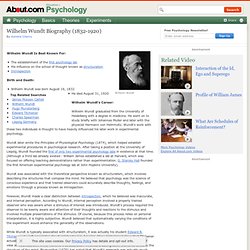
Wundt later wrote the Principles of Physiological Psychology (1874), which helped establish experimental procedures in psychological research. Wundt was associated with the theoretical perspective known as structuralism, which involves describing the structures that compose the mind. However, Wundt made a clear distinction between introspection, which he believed was inaccurate, and internal perception. While Wundt is typically associated with structuralism, it was actually his student Edward B. Wilhelm Wundt - Father of Psychology. By Saul McLeod published 2008 Wilhelm Wundt opened the Institute for Experimental Psychology at the University of Leipzig in Germany in 1879.
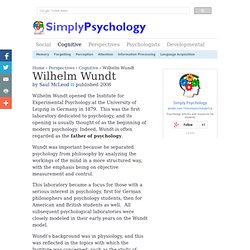
This was the first laboratory dedicated to psychology, and its opening is usually thought of as the beginning of modern psychology. Indeed, Wundt is often regarded as the father of psychology. Wundt was important because he separated psychology from philosophy by analyzing the workings of the mind in a more structured way, with the emphasis being on objective measurement and control. This laboratory became a focus for those with a serious interest in psychology, first for German philosophers and psychology students, then for American and British students as well. Wundt's background was in physiology, and this was reflected in the topics with which the Institute was concerned, such as the study of reaction times and sensory processes and attention. During his academic career Wundt trained 186 graduate students (116 in psychology). McLeod, S. Wilhelm Wundt. Wilhelm Maximilian Wundt (16 August 1832 – 31 August 1920) was a German physician, physiologist, philosopher, and professor, known today as one of the founding figures of modern psychology.
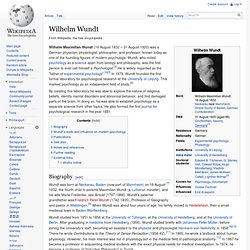
Wundt, who noted psychology as a science apart from biology and philosophy, was the first person to ever call himself a Psychologist.[3] He is widely regarded as the "father of experimental psychology".[4][5] In 1879, Wundt founded the first formal laboratory for psychological research at the University of Leipzig. This marked psychology as an independent field of study.[6] By creating this laboratory he was able to explore the nature of religious beliefs, identify mental disorders and abnormal behavior, and find damaged parts of the brain. In doing so, he was able to establish psychology as a separate science from other topics. He also formed the first journal for psychological research in the year 1881. Biography[edit] In 1867, near Heidelberg, Wundt met Sophie Mau (1844-1912).
Publications[edit] N. Structuralism. PDF version for printing At the turn of the century, many advances in science were occurring due to a fundamental concept that philosophers of science refer to as "elementism".
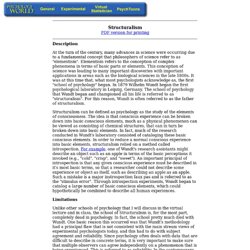
Elementism refers to the conception of complex phenomena in terms of basic parts or elements. This conception of science was leading to many important discoveries with important applications in areas such as the biological sciences in the late 1800s. It was at this time that, what most psychologists acknowledge as, the first "school of psychology" began.
Wilhelm Wundt's Theory & Structuralism: Lesson & Quiz. Wilhelm Wundt and Structuralism. 'Structuralism': The First Paradigm in Psychology paradigm: an agreement within a discipline defining the subject matter to be studied and the correct methods for studying it.
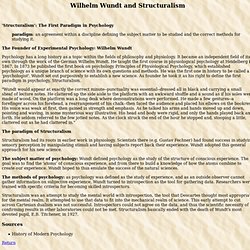
The Founder of Experimental Psychology: Wilhelm Wundt Psychology has a long history as a topic within the fields of philosophy and physiology. It became an independent field of its own through the work of the German Wilhelm Wundt. He taught the first course in physiological psychology at Heidelberg in 1867. "Wundt would appear at exactly the correct minute--punctuality was essential--dressed all in black and carrying a small sheaf of lecture notes. Theory of Interpretation. Abstract Wilhelm WUNDT was a pioneer in experimental and physiological psychology.
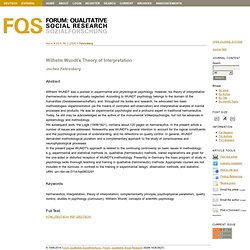
However, his theory of interpretation (hermeneutics) remains virtually neglected. According to WUNDT psychology belongs to the domain of the humanities (Geisteswissenschaften), and, throughout his books and research, he advocated two basic methodologies: experimentation (as the means of controlled self-observation) and interpretative analysis of mental processes and products. He was an experimental psychologist and a profound expert in traditional hermeneutics. Today, he still may be acknowledged as the author of the monumental Völkerpsychologie, but not his advances in epistemology and methodology. Keywords.